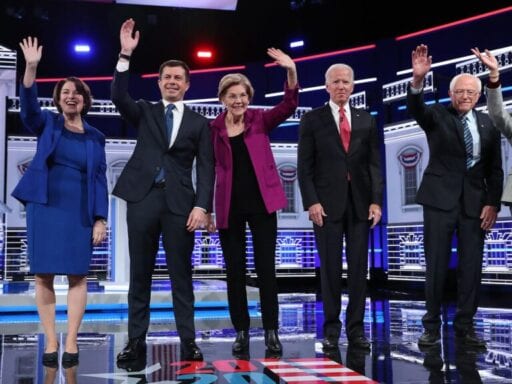Six candidates have made the stage so far.
The third (yes, third) Democratic primary debate of the month will be held in Charleston, South Carolina, on Tuesday, February 25. It is co-hosted by CBS and the Congressional Black Caucus Institute, and will air from 8 pm to 10 pm ET on CBS, BET, and Twitter.
The debate is the last of a deluge scheduled for February, and it’s taking place just days before the South Carolina primary, which will happen on Saturday, February 29. Candidates’ performances onstage could play a critical role — in New Hampshire, many voters who made up their minds late in the race indicated that the debate right before the primary influenced their ultimate decisions.
This debate will also be the final one to occur ahead of the all-important Super Tuesday contests and a slew of additional races in early March. Unlike past debates, Twitter is a partner for this one, and viewers will be able to tweet their questions with the hashtag #DemDebate and maybe see their tweet picked up and asked by the moderators.
The criteria to qualify for this debate is very similar to the requirements for the Nevada debate: Candidates will need to hit a 10 percent polling threshold in at least four Democratic National Committee-sanctioned polls, or 12 percent in two South Carolina polls released between February 4 and February 24. They could also qualify for the debate by winning one delegate to the Democratic National Convention from the Iowa, New Hampshire, or Nevada races.
The set of candidates onstage is expected to be nearly identical to the one we saw at the debate in Las Vegas: Sens. Bernie Sanders, Elizabeth Warren, and Amy Klobuchar; former South Bend, Indiana, Mayor Pete Buttigieg; former New York City Mayor Mike Bloomberg; and former Vice President Joe Biden have already qualified to be onstage. Billionaire activist Tom Steyer could potentially qualify as well, while Rep. Tulsi Gabbard is not expected to.
The South Carolina primary, like Nevada’s caucuses, is one of the first races where voters of color will be strongly represented. In the Palmetto State, 60 percent of the Democratic electorate is made up of African American voters, and the outcome of the primary will signal exactly which candidates are resonating with this constituency.
The debate on Tuesday offers the latest opportunity for candidates to make their case.
The state of the race, briefly explained
The field hasn’t really winnowed much: While some candidates, including Andrew Yang and Michael Bennet, have dropped out, the slate of frontrunners in the race is poised to stick around, at least for a few more states. In South Carolina, Joe Biden still has a slight edge on Sen. Bernie Sanders in the RealClearPolitics polling average. Tom Steyer, meanwhile, comes in third.
… and it’s still fluid for many voters: State after state, the refrain from voters seems to be the same: Many are still making up their minds. Given the unique size of the Democratic field and the disparate strengths of various candidates, voters are continuing to wade through their choices down to the final days. South Carolina, too, is more “muddled” than it’s been in previous years, experts tell Vox.
Bloomberg isn’t on the ballot until Super Tuesday: Despite all the chatter around Mike Bloomberg and his debut at the Las Vegas debate, he won’t be on the ballot in South Carolina. Super Tuesday, on March 3, marks the first time he’s set to appear.
South Carolina is the last of the four early states, right before Super Tuesday
South Carolina’s primary is the last race ahead of Super Tuesday, which is set to include 14 states and more than 1,300 delegates.
South Carolina has historically served as a bellwether for how candidates will do with African American voters in subsequent states, include those on Super Tuesday like Alabama and North Carolina. California and Texas, states with more than 400 and 200 delegates, respectively, are major Super Tuesday prizes as well.
Candidates’ debate showings — and their ability to speak to policies in a way that addresses the interests of a diverse electorate — could prove to be a critical factor for voters across these states.
Author: Li Zhou
Read More



